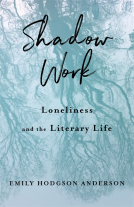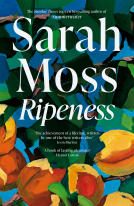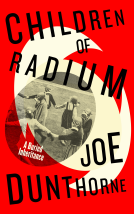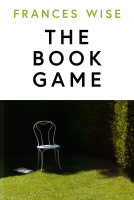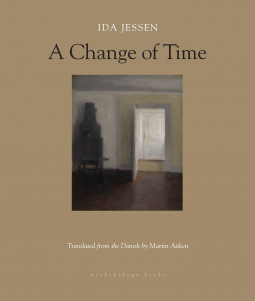
A Change of Time
by Ida Jessen
This title was previously available on NetGalley and is now archived.
Send NetGalley books directly to your Kindle or Kindle app
1
To read on a Kindle or Kindle app, please add kindle@netgalley.com as an approved email address to receive files in your Amazon account. Click here for step-by-step instructions.
2
Also find your Kindle email address within your Amazon account, and enter it here.
Pub Date 16 Apr 2019 | Archive Date 27 Jan 2019
Talking about this book? Use #AchangeOfTime #NetGalley. More hashtag tips!
Description
A penetrating study of a woman who, in the wake of her domineering husband’s death, must embrace her newfound freedom and redefine herself
Set in rural Denmark in the early 20th century, A Change of Time tells the story of a schoolteacher whose husband, the town doctor, has passed away. Her subsequent diary entries form an intimate portrait of a woman rebuilding her identity, and a small rural town whose path to modernity echoes her own path to joyful independence.
“An engaging, honest, and beautifully written look at love, loss, and self-realization.”
—Kirkus Reviews
Advance Praise
"A masterful psychological portrait of an individual, who is set free into a new era, after many years of great loneliness."--Jury of the Danish Writers Association's Blixen Award for A Change of Time "A successful portrait of a widow and her coming freedom. Ida Jessen is sensible and solid in her historical novel A Change in Time."--Mikkel Krause Frantzen, Politiken "One rejoices at how clearly and precisely the book is written." --Dagbladet Information "Once again, Ida Jessen has succeeded in creating a small masterpiece." --Weekendavisen
Available Editions
| EDITION | Other Format |
| ISBN | 9781939810175 |
| PRICE | US$18.00 (USD) |
| PAGES | 250 |
Featured Reviews
 The Idle Woman ., Reviewer
The Idle Woman ., Reviewer
4.5 stars
You must forgive the recent erratic posting. Life has been getting in the way, with lectures and work trips flying at me from all directions, plus some very pleasant socialising. Besides, Wordpress have just introduced a new editor which isn't quite as intuitive as I'd like. But never mind. I'm bumbling on as best I can, and have just finished reading a really gorgeous little book: A Change of Time by the Danish author Ida Jessen. Through her diary, a widowed school-teacher in early 20th-century Denmark remembers her late husband and uses her loneliness as a spur to revisit her life and, slowly, anxiously, recover her sense of self. For once, cover and book coexist beautifully: Jessen's novel is like a Hammershøi in prose: a haunting, timeless, intimate exploration of loss, rendered by the translator Martin Aitken into elegantly spare English. Although the book won't be published until March, I just had to write about it now, before the feeling of it fades; and it's deeply suited to these long, dark winter evenings. A little jewel.
Our narrator doesn't even share her name for most of the book. She is, and has for many years been, known by her husband's name. Now Vigand Bagge, doctor and free-thinker, has gone, secretive to the last, keeping his mortal illness to himself: even, in that small thing, denying his wife the chance to grieve, to cherish him, and to prepare. Vigand was never a man for fussing. And so, with utmost selfishness, he departs his life and leaves his wife startlingly alone in the small town of Thyregod, where he served as physician for many years. The townspeople leave her gifts of food on her doorstep, offering her home comforts without intruding on her grief. And yet does the narrator grieve? Her diary entries record an ongoing conversation with her abrupt, irascible husband, whose no-nonsense put-downs even echo in her ears after his death. And, in this new silence, she sits and feels the discomfort grow, and wonders what life holds now.
Through her writings, we discover the narrator's past: her training as a devoted, enlightened teacher, keen to support the free schools of Denmark in their mission to educate the children of country-folk. With her fellow students, she lives a life of ideals - a life that she is determined to keep up, even after finding a job in isolated Thyregod. Here she strives to teach the children well, and forms a cautious friendship which ends in confusion - and marriage to Vigand, then the new and energetic doctor of the town. It is the story of an arm's length marriage, a union in which neither party has fully been able to show their feelings, and in which neither is happy. 'Can one ask a person to show that they love you?' wonders our narrator of her repressive husband. 'Reason, that most faithful onlooker to the tribulations of others, says no. But what say unreason?'
One can't say much more because this isn't really a book about plot. It's about feeling: the heart laid bare. Its true joy comes from the writing, and I'm not sure whether to credit Jessen or Aitken with that, because the phrases ring so beautifully in English. Consider how this conjures up the darkness of a Danish winter and the feeling of being suddenly, unexpectedly alone:
"[There is a] strange gravity, the peculiar peace that descends in the evenings when the houses turn inwards and people retire to bed. I have begun to expect it, to look forward. It requires so very little. That I am alone, and that darkness has fallen. That I light the lamp. That I gaze into its flame. I do not think of day."
Lamps loom large in the story: a lamp placed in a window shows that a house is a home: that there is comfort and warmth within. But when all that makes a home is suddenly stripped away, what is left? 'It might be night, it might be morning. No light on the stair. No light on the horizon. No lamp lit in the window. No moon held out in the palm of a hand.' It represents not only life but possibility, and the most significant encounters in the novel seem to take place in that liminal space between day and night, in the twilight. It feels like poetry - told in slow motion, though with such matter-of-fact grace that it seems to be trying to hide its light under a prosaic bushel. It doesn't succeed. A truly wonderful little book, a little pool of contemplation, which could have as easily been written in the 1920s, the period in which it's set, as today. Except, perhaps, the final exchange in the book, the last couple of lines, which are so utterly delightful, so life-affirming, so beautifully romantic, after all that's gone before, that they leave you beaming.
Ida Jessen's quite a find. I wonder what else she's written? I don't expect to find anything which replicates this particular blend of old-fashioned beauty - the book is a tribute to her home town, as much as anything, and the sense of place is vividly conveyed, with all the detail that you'd expect of someone who has come to know a small space intimately. But I would love to see what she writes when in other moods. A fine addition to Archipelago's endlessly adventurous catalogue, and highly recommended for those moments when you need some evocative peace.
For the post, please see my blog:
https://theidlewoman.net/2018/12/01/a-change-of-time-ida-jessen/
 Abby S, Reviewer
Abby S, Reviewer
Set in rural Denmark a woman a new widow her domineering controlling husband gone.A new life to lead freedom to choose her new path new life.new discoveries new emotions.A beautiful read a book that can not be forgotten .#netgalley #archipelago
 Sue B, Reviewer
Sue B, Reviewer
What an emotional experience reading this story turned out to be. It is made up of diary entries by a Danish woman, mostly written when she is approaching 50 in the late 1920s. Her husband of over 20 years is dying in hospital and she begins to record her thoughts and feelings over the next five years. These include recollections of her student days and her friends at that time, her innovative approach to schoolteaching, the people she knows after moving to Thyregod, her husband’s character and her disappointment with their marriage, her reaction to his death and the change in her personal circumstances, and many observations of the ways the landscape and people’s lives in the central heathland of Denmark evolved in the 20th century. I particularly enjoyed the descriptions of daily life at the school and then at the cottage and its garden.
Since the story is told through a diary not intended as anything but an outlet for its writer’s current emotions and recollections, past events are often alluded to in passing, tantalisingly so. She is not explaining anything to anyone but is venting her feelings for herself only, and trying to come to terms with the way her life has turned out. Hints overlooked and motivations misunderstood are key and Lilly struggles not to succumb to self-pity and bitterness. Ida Jessen is a classy writer, conveying emotion with delicacy and sensitivity, and with an understatement reflecting the reticent character of the people here. I was particularly struck by Lilly’s ambivalence towards her new freedom, the sense that her husband took her identity as a wife with him when he died and she must learn how to be a widow, a different kind of single person.
This format is very much to my taste. I like to wonder what might have happened and wait for things to become clear by the end. In fact I don’t even mind being left wondering. The ending is abrupt. Events take place that mean the need for the diary has gone so she stops writing in it, much as she did once before. So that’s that, for the time being at least. I loved it, both the book and the ending. I can’t recommend it highly enough.
Beautifully written short novel set in rural Denmark in 1927-32. The main character is a school teacher (married to the village doctor) and I just love her. She is a working woman in an age when not many women were working and she is a strong woman, which you notice especially when her husband dies. Of course she mourns her husband, and she feels vulnerable and lonely. But she is not afraid to make decisions, start driving a car, move houses, start a new life, having friends, and doing new things. She is also very honest about her marriage and her feelings for her husband. She loved him, but she also found him annoying at times and he was not always great to be around with.
All in all, a very impressive read! I'm looking forward to reading more of Ida Jessen's work.
 Meike S, Media/Journalist
Meike S, Media/Journalist
Award-winning Danish author Ida Jessen tells the story of a teacher who, after losing her husband, has to make a new life for herself - what makes this novella so compelling is the voice of the widow as the unreliable narrator who slowly reveals the true nature of her marriage, and the possible contrasts between her and the reader's assessment of her husband's behavior. On top of that, Jessen paints a vivid picture of rural Denmark in the early 20th century and the dynamics in the town which are often equally a form of control and support.
The widow tells her story through diary entries, often depicting nature and encounters with townfolk, but more and more also flashbacks into her past as she strives to find closure. The book does require a patient reader who is willing to settle into the contemplative mood of the text, but once you really dive into it, the current will take you along and pick up speed.
A beautiful book.
 Giovanna P, Reviewer
Giovanna P, Reviewer
this is a tender, meditative book written in the form of diary entries by an on and off school teacher in a small town in rural denmark in the 1920s. the teacher, whose name is revealed, poignantly, only at the end (i won't spoil it for you because it's a sweet, sweet moment) starts to keep journal entries in earnest when her husband is in the hospital dying, and in fact writes consistently only when she is deeply alone, so that most of what we get from this book is how to live alone with snow and nature and long walks regardless of the weather. as she writes, our narrator thinks back on her life before her marriage to the town doctor, and of her life during the marriage, and in the rhythm of the narration, which is also the rhythm of the writer's mind, there is great strength and great acceptance, but also great resolve. she is a formidable character whose qualities emerge slowly as she talks to herself and, because this is a novel, to us.
this is also a portrayal of denmark, a country about which i knew absolutely nothing. it is purely coincidental that i read two books set in denmark back to back, and now i feel i know a little bit more (how could i not?), and also feel that when we think we know a place because of this or that headline in the news we really don't know a damn thing (the other novel is the extraordinary Mirror, Shoulder, Signal). for one, for a country this small, denmark appears to be deeply cleaved by regional differences. this should not be surprising to this italian but it is. for two, denmark seems to have a strange and mysterious area, the heath, sandy and shifting and unforgiving, much of which has probably been conquered by agriculture right now, but which, still, i'd love one day to see.
there is no way a woman can write deeply about her life without talking about men. the men in this particular book are lovely even when they are not. they are also very male, closed off or shy or indecisive, as men are often acculturated to be. our narrator is kind to them all, as they are, in their own ways, to her. there are also meaningful female friendship, grounded in shared pain and tenacious.
this novel makes me nostalgic for a time and place in my life in which people dropped in and out of each other's house, bearing small gifts, invariably being asked to stay for coffee. it seems this is like life should be, and yet i can't imagine its being like this now, in these time and place in which life has placed me. still, we are all a little less lonely when people drop in on us with a few apples or a sapling for our garden, all the while making sure we are okay.
 Subashini N, Reviewer
Subashini N, Reviewer
An intensely quiet, private novel told in diary entries as a schoolteacher in Denmark in the 20th-century deals with her husband's passing and sifts through her memories. The language is luminous and precise, rendered in a beautiful translation by Martin Aitken. The narrator herself is prickly, odd, thoughtful, and unique, and her relationship with her husband reveals itself slowly. Rural Danish society is slowly brought to life. A small gem.
 Rebecca B, Reviewer
Rebecca B, Reviewer
A Change of Time is a beautiful novel, using diary form to trace the gradual reawakening of a woman whose marriage was a disappointment, to say the least. The jumps in time between entries and the narrator's own wandering thoughts, combined with her reticence to outright criticise her dead husband, means the reader very slowly pieces together the marital coldness and cruelty that gradually drained hope from the young teacher, and her growing discovery of her new freedom. It's a bit of a slow burn but definitely rewards sticking with it!
 Maggie R, Educator
Maggie R, Educator
This short quiet book embodies two qualities that are so compelling to this older reader. First, the moving introduction to a woman in the later years of her life who is prodded by circumstances to examine that life and make sense of it. Second, the convincing conclusion that the value of the whole of that life is not spoiled by what is passed, but is illuminated and made worthwhile by that understanding.
 Ilse A, Reviewer
Ilse A, Reviewer
'I feel like a person standing in a landscape so empty and open that it matters not a bit in which direction I choose to go. There would be no difference: north, south, east or west, it would be the same wherever I went.'
Thyregod, Denmark at the beginning of the 20th Century. Through diary entries, Ida Jessen conveys the life of a schoolteacher, Lilly Høy, starting with recounts of her visits to her husband Vigand Bagge who is in the hospital in another town, over her response to his death and her attempts to build herself a new life, find herself a new place and identity in the rural community she is living in and find attachment to her life again.
Slowly, as Lilly through subtle allusions, flashbacks, encounters and meaningful silences discloses her past, Lilly’s life turns out to have been far less conventional than one would have expected for a woman living at that time in such a remote rural place. Before she came to live in Thyregod where she met her husband, Lilly was a vivid and intelligent student, who moved to the rural village to put her ideals as a teacher into practise. Contemplating on the past and the present now she is alone, she reflects on her relationship with Vigand, her spouse for 22 years, who was a district physician ‘for fourteen impoverished and far-flung parishes’ – a stern, taciturn, stoic man, thirty years her elder and emotionally aloof – painting a portrait of their marriage in which tiny anecdotes and moments illustrate their inability to connect, revealing Lilly’s struggle with finding a way to live together with her husband, from her angling for a tender word or a caress to her walking on eggshells not to speak a word that would lead to more marital scorn.
'Can one ask a person to show that they love you? Reason, that most faithful onlooker to the tribulations of others, says no.
But what says unreason?'
There is the mourning for the person her husband was, but also the grieving for the lost life, the grieving for the lost self, a confrontation with the sacrifices made, the self-repression. The voice and thoughts of the one she has lived together with for such a long time continue to resonate in her own thoughts and acts, tending to censure and curb her, showing the slowness and necessity of the process of dislodging. Her grief is in several respects equivocal, mirroring the nature of the marriage (who told me it is worse to be lonely with two than alone?).
'In my darkest moments I understand only too well what misfortune can leave a person in such a place. Bitterness is a very soft and comfortable armchair from which it is difficult indeed to extract oneself once one has decided to settle in it.'
The portrait of Lilly and her current life and past which drop by drop forms in the mind of the reader is finely constructed, the silences, understatement and twofold interruptions in the stream of the diary are eloquent as well as potent.
Reading Jessen’s articulate and luminous sentences drew me into the wintry silence of Lilly’s evenings, sitting alone at home, evoking the inwardness of the story magnificently. I smiled at the thought of myself as a woman reading about another woman alone in a silent house at night who also reads in silence, under a lamp – like looking at a painting depicting a person looking at a painting on which someone is looking at a painting.
'No love is ever without grief.'
Apart from the masterly evocation of the restrained emotions and inner experiences of growth and regained freedom of a woman who gets widowed, the novel through the description of everyday life and Lilly Høy’s personal history throws a light on the geography and history of the rural, poor area and life in a small village community in Denmark early 20th century (the diary spans the period 1904-1932) and the social changes taking place during that time, developments in which both spouses will play their part. And so the title of the novel ‘A change of time’ (literally from the Danish ‘A new time’) has a dual significance: both for Lilly Høy and for the village community dawns a new life, characterised by change and modernity.
Beautifully slow-paced, poetic and atmospheric, as an intimate meditation on how life goes on after the death of a spouse, A change of time reminded me of Often I Am Happy by Ida Jessen’s compatriot Jens Christian Grøndahl. As much as I loved Grøndahl’s novel, Ida Jessen’s novel touched me even more profoundly by its quiet finesse, elegant prose and subtle depiction of its social context and while reading, I marked numerous sentences that struck me for their insightfulness, honesty and truth. Though quite different, both novels hold a gratifying and heartening ending: Grøndahl’s empowering, Jessen’s of an embracing warmth and tenderness that made me vicariously glow in the dark.
''A warmth unfolded and spread – I know now that it was tenderness.'
'My heart runs ahead of me. And I run after my heart. I cannot be without it.'
While typing this review , I discovered that Ida Jessen wrote a pendant to Lilly’s story, this time seen from the perspective of her husband, Vigand (Doktor Bagges anagrammer). I like that premise of creating a diptych embodying an in-depth exploration of his personality by offering him the chance to tell his side of the story and I would love to read that book too if it happens to get translated in English or Dutch. This excursion to Danish contemporary literature turned out a truly rewarding one.
 Mandy J, Reviewer
Mandy J, Reviewer
This beautifully written and gentle tale is a real joy. Set in the village of Thyregod in rural Denmark, in the early 20th century and narrated in a series of diary entries, it’s the story of Fru Bagge, who, as the book opens is visiting her sick husband in hospital. He’s always been a cold and undemonstrative man, domineering and unsympathetic to her needs, and even on his death-bed makes no attempt to communicate with her. After his death she begins to look back over her life and prepare for her new freedom. A successful and admired schoolteacher, she was indeed once an independent woman and gradually she begins to regain that autonomy. It’s an empathetic and moving story, suffused with sympathy and understanding, and Fru Bagge’s journey of self-discovery and reinvention is a hopeful and relatable one.
Imagine that you are watching a Scandinavian movie with its slow pace and introspective mood and you will have the sense of what is reading this book.
Through the diary entries of a former school teacher we get a sense of how time changes, how we change with it, and how the world around us also evolves. There's this time element across the book, through the different seasons that follow each other, the comings and goings of people in our life, and the changes in everyday life.
I really enjoyed reading it, and recommend it to all those that enjoy good introspect books, that make us wonder.
 Reviewer 68310
Reviewer 68310
This is one of those books where not a lot happens so it really depends on the writing and because this is translated it is the translator’s skill that actually really shines here. This is a novel told entirely through journal entries and you get no backstory or explanations but at the same time you're kind of drawn in very slowly but surely. There's a sort of ethnography going on here because there's a lot of little details included and there's a lot of subtleties that really kind of brings to life the sense of a very small community.
 Juliana B, Reviewer
Juliana B, Reviewer
A Change of Time (2019, tr. Martin Aitken. Original: En ny tid, 2015) is the record of a woman’s passage through grief.
Told through diary entries written by a woman who is, for much of the story, referred to by her married name (Fru Bragge), the novel opens in 1927, when our narrator’s husband is in the hospital. His name is Vigand Bagge, he is the local physician in the small town of Thyregod, and he knows he is going to die. He keeps his illness to himself and, unbeknownst to his wife, drives to the hospital wearing the suit with which he is going to be buried. He never tells anything to our narrator, and he never says goodbye.
We have a sense that there is something amiss with their marriage and, as the narrative progresses, we learn how and why. “Can one ask a person to show that they love you? Reason, that most faithful onlooker to the tribulations of others, says no. But what say unreason?”
Two decades earlier, in 1904, our narrator, then in her mid-twenties, had come to Thyregod to work as a schoolteacher. She is the first woman in the town to ride a bicycle (and later will be the first widow to apply for a driving license). Vigand is twenty years older, they barely know each other, but they get married – for reasons we will come to learn.
Now, Fru Bragge is 47, her husband is about to die, and, after 22 years of companionless marriage, she will be alone: our narrator will have to learn how to rely on herself again. “What will I do when he is no longer here? Who will then remind me of what I am to think? Who will keep me in place? I shall have to find my own place.”
Her diary entries begin as a record of an ongoing conversation with Vigand, and grow to be a conversation she holds with herself. Through her diary, our narrator will come to find a voice and a place – her own place, a room of her own.
In the process, her past will slowly unravel, and the complex portrait of grief the author paints here is the highlight of the novel for me. A death in the family inevitably demands some form of reckoning. Rather than presenting a simple picture of a woman ‘reclaiming her own identity’, this novel takes a step back and records the process of painting that picture itself: it is the record of a woman wrestling with conflicted feelings and unlearning herself; a woman both missing her husband and feeling bitter and angry at him; a woman feeling lost, but also free. “I am filled by a mad desire—not to cease to exist, but to be alone. To have no one come. No one look in on me. No kindness, no outstretched hands.”
This is no straight path, and the narrative meanders back and forth between past and present, and continues into the future. We feel as though Fru Bragge were sifting through her memories to find the young schoolteacher who arrived in Thyregod more than 20 years earlier. The grief for the loss of her husband is mingled with a grief for the loss of what could have been, if she hadn’t married. “Thinking back, I almost feel envious of that young schoolmistress. In fact, there is no almost about it.”
It feels as though both the young and the middle-aged versions of the narrator were coming of age together, in real time, walking toward one another to finally meet in the middle, in an embrace that is the cusp of some form of change.


